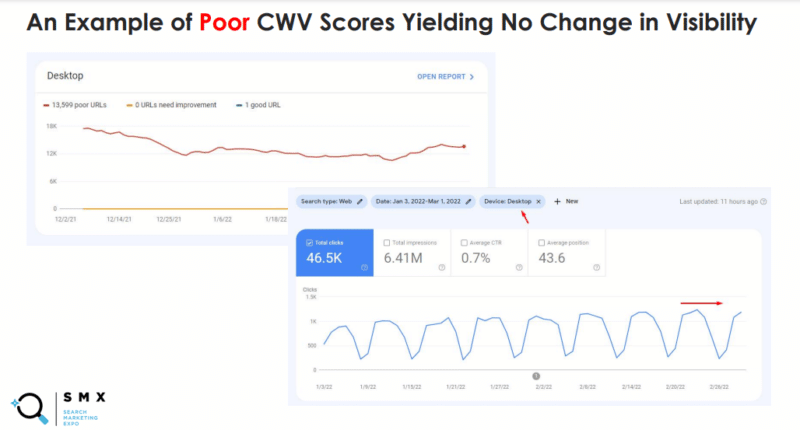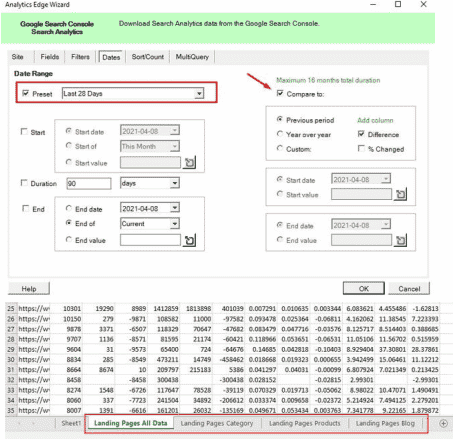“Not all Google updates are equal,” said Glenn Gabe, SEO consultant at G-Squared Interactive, in his presentation at SMX Advanced. “Google pushes thousands of changes per year, but some are small and some are large.”
Whenever a new Google algorithm update is announced, SEOs often spend a lot of money, time, and resources optimizing their sites. And while this can be a good thing, as it helps improve these properties, it can also distract marketers from higher priority tasks when the update is overhyped.
For example, many sites worked heavily on improving Core Web Vitals even though the page experience signal is lightweight (more of a tiebreaker). Gabe showed examples of sites that saw no movement at all when their CWV scores were “poor” and “good”.


To properly address these updates — and discern what impact they will have — Gabe offered SEOs a few tips that can help them get to the heart of the issue.
Don’t jump to conclusions
Any major drop in rankings/visibility following a Google update will undoubtedly spur many SEOs to action. But, to avoid wasting too much of your valuable time and resources, Gabe recommended getting all the facts in place before jumping to conclusions.
“Avoid the knee-jerk reaction when rankings drop,” he said. “You might need to [make changes], or you might not need to. A drop during a major algorithm update could be due to relevancy adjustments, intent shifts, or overall site quality problems.”
“All of these are very different, so don’t just charge ahead,” he added.
Gabe suggests marketers create a delta report to analyze these changes. This type of report will detail changes in your top landing pages and queries, allowing you to pinpoint those that have dropped during significant algorithm updates. It can also reveal the root cause of the drops and help teams determine the next steps.

“This is quick, easy, and packed with punch,” he said. “It can reveal a lot of information.”
Determine if there are site quality issues
Sometimes visibility changes following a Google update stem from a quality issue with your site, rather than a change in the algorithm or new competitors.
“If you determine this is the case, there’s good and bad news,” Gabe said. “You can address those problems and see recovery eventually, but it takes significant work over the long term. You will typically not recover quickly — it’s usually months of hard work.”
Gabe said that when addressing these quality issues, site owners should analyze their sites through the lens of broad core algorithm updates, then work to improve content quality and user experience. This means reviewing potential technical SEO problems that could be affecting site quality as well.
“As Google’s John Mueller explained, when you think about quality, it’s not just about content,” said Gabe. “It’s not just about the text on a page, so don’t just focus on what people are reading.”
Pay attention to E-A-T
“E-A-T, or expertise, authoritativeness, and trust, is super-important,” said Gabe. “You could think of Google’s algorithm like a human who’s asking if the [site] creator has expertise on a topic. You have to look at your content objectively.”
Because E-A-T isn’t a score or scale, it’s not always easy determining how well your site embodies its principles. Yet Google’s documentation has highlighted its importance — especially when future-proofing sites for algorithm updates. So, SEOs should ensure they’re adhering to its standard.
When it comes to improving E-A-T after a ranking drop, many SEOs focus on improving content quality and thoroughness, which are incredibly important. But, as Gabe noted, authoritativeness is also heavily influenced by links and mentions from authoritative sites.
“If you do the right things content-wise and build trust with your audience, links and mentions from well-known sites could help from an E-A-T standpoint,” he said. “It’s not easy to fix this problem if you don’t have a lot of authority, but you can work at it over time.”
“It’s really important to identify, plan and execute changes to improve the site overall,” he added.
Watch Glenn Gabe’s full SMX Advanced presentation
Not registered for SMX Advanced? Get your free pass here.
Already registered for SMX Advanced? Log in here.
The post What to do if you’re negatively impacted by a major algorithm update appeared first on Search Engine Land.
No comments:
Post a Comment